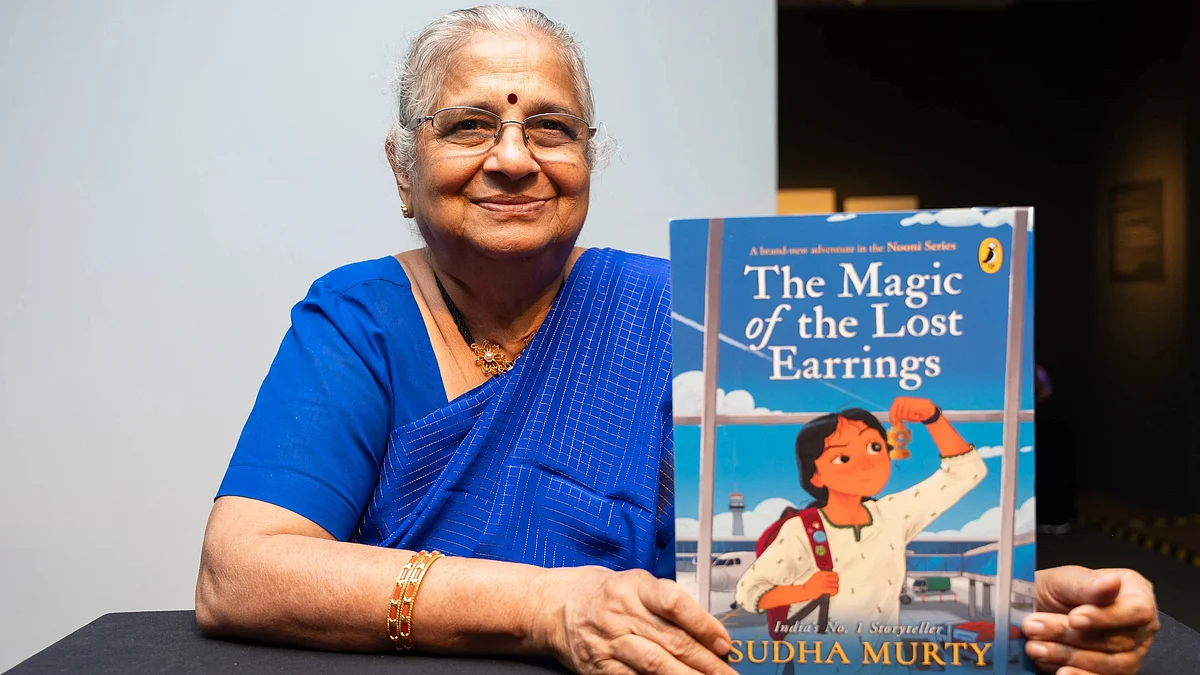
Sudha Murty Celebrates 50 Years Of Storytelling With Launch Of New Book
Sudha Murty has been writing ever since she was in school. She published her debut book at 28, and now, as she launches her 50th title The Magic of the Lost Earrings, we delve into her journey as a storyteller - her childhood, her love for reading, and her timeless wisdom for parents. A familiar face in Dubai, Murty often visits the city for educational and cultural events.
Edited excerpts from an interview:
Recommended For YouYou've written numerous children's books. What draws you to writing for this age group?
Growing up, I didn't have many reading options. Still, I tried to read different books at different age groups. I used to read historical books a lot. I love to read about India. Through my books, I want to convey my thoughts and stories to children, which I love to do.
Tell us about your 50th book?
My new book The Magic of the Lost Earrings, the third book in the Nooni series, is meant for teenagers. Nooni refers to Anushka, who is my granddaughter. So, I thought let me take a typical teenager and talk to her and introduce her to different subjects. First, I started with The Magic of the Lost Temple, then I wrote The Magic of the Lost Story and now the third book in the series is The Magic of the Lost Earrings, which follows Nooni's journeys to uncover mysteries, learn about history, and explore themes like heritage, freedom, and community.
Tell our readers about your childhood and how that finds its way into your storytelling?
I grew up in a village with absolutely no entertainment. There was no electricity as it's a village, so I spent lot of time with my grandparents. I felt it's always nice to sit with your grandparents and listen to stories. Today, my grandchildren are abroad so I cannot sit with them and spend months together on telling stories. Now, all new generations have come – Gen-Z, Alpha, Beta, but stories are stories, so I started writing stories. And the main character in my story is the grandma, who is called Ajji, which is me actually. What I would have told my grandchildren if they were with me, I tell to all the children through my stories.
As a child, what were some of your favourite books?
Well, there was not much choice in those days. Different age had different books. When I was eight, I used to read Chandamama (an Indian magazine for kids). At 14-15, I used to read historical novels. Later, different authors, experiences shaped my thoughts and storytelling.
When raising kids and writing books: what is the kind of support you got from NR Narayana Murthy at home?
I don't write because I'm married to Narayana Murthy (founder of the Indian software services firm Infosys Technologies) or he supported me. As a child of 10-12, I used to write essays; in college level, I used to write a lot more essays and short stories. My first book came when I was 28-29. In around 50 years, I have written 50 books. This creativity comes from my observation and the kind of work I do with the poorest of the poor people. All of this ignites my imagination.
What are the key learnings from your books that you want to share for Gen Alpha and Gen-Z?
Plus, Gen Beta (laughs). Number one, it's hard for them to understand the importance of patience. They want anything, they get it immediately through parents, computers or digital media, so the gratification is very high. But real life is not like that. A mother will give birth only after nine months.
Even if you are Gen-Z you need to wait. There is a quality known as patience, which is very important. Second, I want to teach children about my country, the heritage of my language. My books: The Magic of Lost Temple and The Magic of Lost Stories and now The Magic of Lost Earrings-all these books talk about India, its history and culture in a lighter way.
What are some key values you want parents to learn?
I really wish parents stop competing with other parents, which they do. Compete with yourself not others. Next, parents should stop taking so much pressure which ultimately passes on to the child. You can only put as much pressure as the child is capable of. Don't do that but at the same time, don't make them lazy.
...

Legal Disclaimer:
MENAFN provides the
information “as is” without warranty of any kind. We do not accept
any responsibility or liability for the accuracy, content, images,
videos, licenses, completeness, legality, or reliability of the information
contained in this article. If you have any complaints or copyright
issues related to this article, kindly contact the provider above.


















Comments
No comment